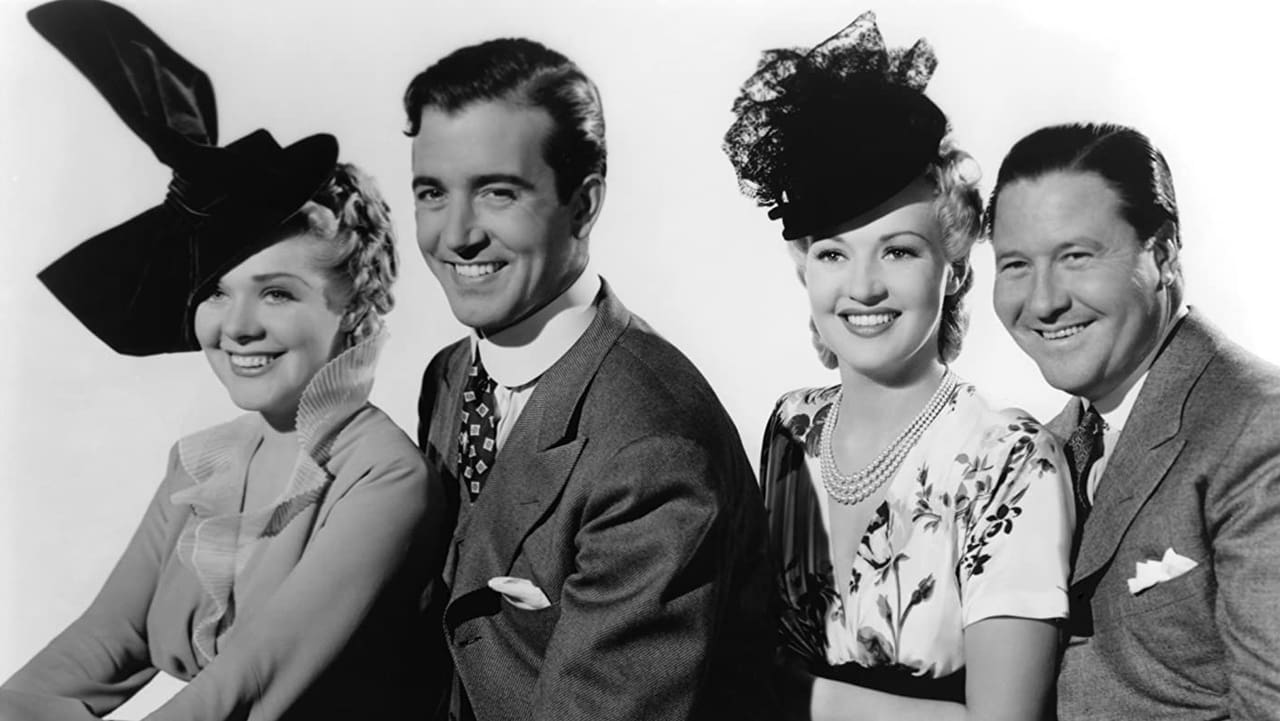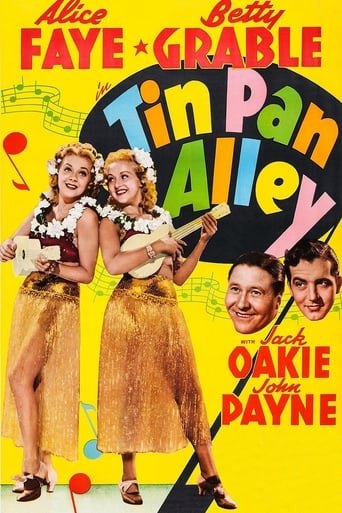

Copyright 29 November 1940 by 20th Century-Fox Film Corp. New York opening at the Roxy: 21 November 1940. U.S. release: 29 November 1940. Australian release: 17 April 1941. Original length: 9,000 feet, 100 minutes. Cut to 8,757 feet (97 minutes) in Australia and to 92 minutes in U.S.A. by deleting a song number, "Get Out and Get Under", featuring Faye, Grable and Oakie.SYNOPSIS: 1915-1919. Rags to riches to rags and back story of a couple of song publishers, one of whom is dumb (and greedy) enough not to realize Alice Faye is a loyal, sensitive girl who's in love with him.NOTES: Tin Pan Alley originally went into production in Technicolor. About half the film was photographed in color (approximately the first half, although there are a couple of later sequences in which the grainy lighting and too-thick make-up indicate original color cinematography) before the process was abandoned. Why is a good question. Two reasons: (1) The Sheik of Araby number ran into censor difficulties ("too much showgirl") and had to be re-shot. It certainly looks less daring in black-and-white. (Perhaps the Nicholas Brothers and Princess Ammon were also added at this stage to give the number "class"); (2) Zanuck felt that Technicolor flattered Grable at Faye's expense. Alice had made her color debut in Hollywood Cavalcade in which she looked great but had no competition. Immediately Tin Pan Alley was in the can, Zanuck rushed Alice into That Night in Rio, her second Technicolor feature, this time with a safe co-star - Carmen Miranda.Alfred Newman won an Academy Award for Best Score. This was the film's only nomination. Because of the color/black-and-white compromise, photography and art direction were ineligible for nomination, but it is strange that "You Say the Sweetest Things, Baby" was not proposed for Best Song. It's not only the first song Harry Warren and Mack Gordon wrote for Alice (it remained her personal favorite of all her numbers) but it's given such a stand-out treatment with such an elaborate musical reprise, I can't figure how any nominator could possibly miss it.The film was remade in 1950 as I'll Get By, with June Haver and William Lundigan directed by Richard Sale.COMMENT: There has to be a higher rating than 100% for this movie. Alice of course dominates the film but she is not allowed to completely overshadow the rest of the cast - as some critics have claimed. True, the script has John Payne elbowing Betty Grable aside to give Alice a shot at "Moonlight Bay", but Betty is by no means neglected. Although she has no romantic steady, she has a couple of solo production numbers as well as joining Alice for "Hawaii" and the movie's delightfully zesty showpiece, "The Sheik of Araby".Comedian Jack Oakie has a regal share of the limelight too, while Payne has if anything even more footage. And there's a grand supporting roster including Allen Jenkins, Elisha Cook and Charles Wilson (all of whom have some delightful running gags), not to mention Esther Ralston, Billy Gilbert, the Nicholas Brothers and Billy Bevan who are also given their opportunities to shine.It's to Alice's credit that she's so electrifying we still pine when she's off-screen (which is really quite often), especially during the straight Payne episodes. Fortunately the songs are an incomparably breezy lot - and they are given a marvelously aggressive orchestration and often an all-stops-out treatment with elaborate reprises and thrilling montages. The sound of course is absolutely dazzling.Walter Lang's pacey direction makes the most of the picture's superb production values. No expense whatever has been spared on lavish sets and crowd scenes. And what about those incredible period costumes that Alice and Betty fill so gracefully? All told, marvelous entertainment with catchy songs, amusing business and a power-plus cast. Hollywood zest at its best!
... View MoreJack Oakie (Calhoun) and John Payne (Harrigan) are a couple of songwriters on Tin Pan Alley. They need a hit to pay their rent and Oakie puts in a call to a friend Alice Faye (Katie) to come and help them out performing songs. She brings along her sister Betty Grable (Lilly). They achieve success but things don't go as planned especially with the romance between Payne and Faye. Can they all get together again by the end of the film? Have a guess The cast are fine with Betty Grable coming across as the most likable. Alice Faye is a bit precious, John Payne is a bit negative while Oakie has loads of energy. He is, however, a good balance for Payne who can be a bit moody. As for the songs, I liked them all, especially the first one that Faye and Grable sing and dance to. There is a running joke throughout the film as Oakie keeps changing the words to the song but I reckon it needs no improvement from this opening number. "Moonlight Bay" is another standout as is the whole "Sheik of Araby" sequence with the Nicolas Brothers doing their thing! I disagree with other reviewers in that I found "America I Love You" to be the worst offering.As regards the story, the Nora Bayes reference was lost on me and, unfortunately, will be lost on many others. However, it was made clear that she is big news, and if she comes knocking at your door to sing one of your songs, then you don't turn her down. And this is where the film gets a little silly. Payne gives her the song to sing and Faye seems hostile to the idea. Faye should be supportive of this move – what a coup! The next bit also doesn't make sense, as success for Payne doesn't seem to take off for him once Faye leaves to join her sister. The whole point of giving Nora Bayes the song was to gain instant success on the back of it.The story is slight but it is the musical segments that bring the score for this film into a higher bracket. They are the only memorable parts of the film and the only parts worth re-visiting.
... View More"Tin Pan Alley" is a rare misfire for Fox, which had a string of hits around this time period. In fact, they used several of the same stars in this one as in previous pictures. Alice Faye, John Payne, Betty Grable and Jack Oakie - what more could you ask for? Well, you might ask for some better songs and a better storyline, because this plot is threadbare and had been done better many times in the past. Boy meets girl, Boy loses girl ( because pride goeth before a fall), boy wins girl back. Did you read the list of song titles? Well, most of them are background music except for "You Say The Sweetest Things", which was written especially for this picture and was the best number.Special mention should be made of "America, I Love You", to which I have awarded a Hand-Painted Mustache Cup for the Worst Production Number In A Major Musical. Mournful and tuneless, this song was given a big build-up as a flag-waving tribute to the troops in WWI and all concerned tried mightily to put it over. This dreadful song, however, defied all efforts and pulled down an already routine musical into subpar status.If you like the cast and if you like Fox musicals - and there are many to like - try another picture.
... View MoreThis is a delightful film with some of the best stars from the 40's. Alice Faye has been a personal favorite of mine for years and her beautiful contralto singing voice is only one reason. She is also charming and beautiful, and it's no wonder she was 20th Century Fox's top blonde star for many years (until Betty Grable, who is, of course, also in this film). Alice and Betty make believable sisters and perform some knockout numbers together (especially "The Sheik of Araby", which also boasts the talents of the marvelous Nicholas Brothers). Alice is paired romantically in the film with John Payne (a frequent costar), and their chemistry makes you understand why Fox paired them often in film. The songs are delightful and the movie captures the image of Tin Pan Alley that may not have existed in reality, but isn't the image on film more romantic and lovely to look at? The only quibble I have: why, oh why wasn't this filmed in Technicolor?
... View More